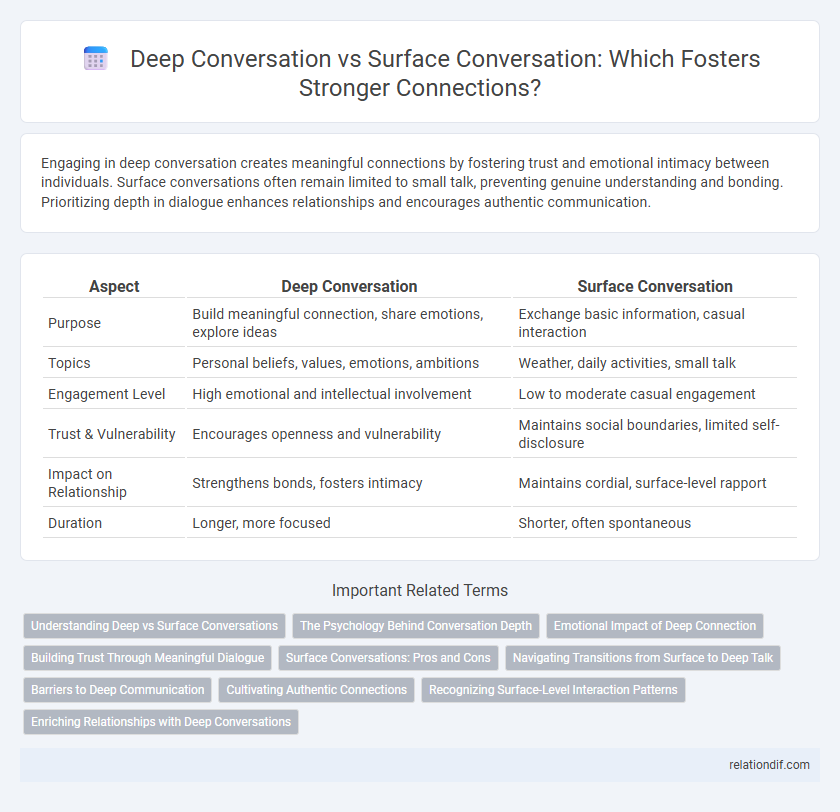Engaging in deep conversation creates meaningful connections by fostering trust and emotional intimacy between individuals. Surface conversations often remain limited to small talk, preventing genuine understanding and bonding. Prioritizing depth in dialogue enhances relationships and encourages authentic communication.
Table of Comparison
| Aspect | Deep Conversation | Surface Conversation |
|---|---|---|
| Purpose | Build meaningful connection, share emotions, explore ideas | Exchange basic information, casual interaction |
| Topics | Personal beliefs, values, emotions, ambitions | Weather, daily activities, small talk |
| Engagement Level | High emotional and intellectual involvement | Low to moderate casual engagement |
| Trust & Vulnerability | Encourages openness and vulnerability | Maintains social boundaries, limited self-disclosure |
| Impact on Relationship | Strengthens bonds, fosters intimacy | Maintains cordial, surface-level rapport |
| Duration | Longer, more focused | Shorter, often spontaneous |
Understanding Deep vs Surface Conversations
Deep conversations involve meaningful exchanges that explore emotions, beliefs, and values, fostering genuine understanding and connection between participants. Surface conversations focus on routine topics like weather or small talk, serving as social lubricants but rarely building substantial relational depth. Recognizing the distinction between these types enables more intentional communication that strengthens interpersonal bonds and empathy.
The Psychology Behind Conversation Depth
Deep conversations activate the brain's default mode network, fostering empathy, trust, and emotional bonding by encouraging self-disclosure and vulnerability. Engaging in surface-level conversations primarily stimulates the executive control network, which manages routine social interactions without forming significant emotional connections. Psychological studies reveal that depth in conversation correlates with increased oxytocin levels, enhancing feelings of social closeness and long-term relational satisfaction.
Emotional Impact of Deep Connection
Deep conversations foster a profound emotional impact by allowing individuals to share vulnerabilities, thoughts, and feelings beyond superficial topics. These exchanges enhance empathy, trust, and understanding, creating a lasting sense of closeness. Emotional connections formed through deep dialogue significantly improve mental well-being and relationship satisfaction.
Building Trust Through Meaningful Dialogue
Meaningful dialogue fosters deep connection by encouraging vulnerability, active listening, and empathy, which builds a foundation of trust more effectively than surface-level conversations. Deep conversations allow individuals to share authentic thoughts and emotions, creating a safe space where trust can grow and strengthen relational bonds. Prioritizing quality interactions over quantity leads to lasting trust and deeper understanding in personal and professional relationships.
Surface Conversations: Pros and Cons
Surface conversations facilitate quick rapport and ease in social settings, enabling individuals to exchange pleasantries and establish initial connections without emotional risk. However, they often lack depth and meaningful insight, potentially leading to superficial relationships that fail to foster genuine understanding or trust. Balancing surface interactions with deeper dialogues is essential for cultivating both social ease and authentic connections.
Navigating Transitions from Surface to Deep Talk
Navigating transitions from surface to deep conversations involves recognizing cues such as increased emotional openness and curiosity about personal values. Asking thoughtful, open-ended questions encourages vulnerability and fosters trust, helping both parties feel safe to share authentic experiences. Maintaining attentive listening and empathetic responses strengthens the connection, allowing the conversation to naturally evolve into more meaningful territory.
Barriers to Deep Communication
Barriers to deep communication often include fear of vulnerability, lack of trust, and distractions from external environments, which prevent individuals from fully opening up and sharing authentic thoughts and emotions. Emotional walls built from past experiences and societal norms further hinder meaningful exchanges, limiting conversations to superficial topics. Overcoming these obstacles requires intentional mindfulness, empathetic listening, and creating safe spaces that foster genuine connection and deeper understanding between participants.
Cultivating Authentic Connections
Deep conversations foster authentic connections by encouraging vulnerability and genuine emotional exchange, creating trust and empathy between participants. Surface conversations often limit interaction to superficial topics, hindering meaningful understanding and emotional bonding. Cultivating authentic connections requires intentional listening, open-ended questions, and shared personal experiences to move beyond small talk and build lasting relationships.
Recognizing Surface-Level Interaction Patterns
Recognizing surface-level interaction patterns involves identifying shallow exchanges characterized by generic topics and minimal emotional depth. These conversations typically rely on safe, scripted responses that avoid vulnerability or personal insight. Understanding these patterns helps in distinguishing deeper, meaningful dialogues that foster genuine connection and trust.
Enriching Relationships with Deep Conversations
Deep conversations foster emotional intimacy by encouraging vulnerability and honest expression, which strengthens trust between individuals. Engaging in meaningful dialogue enhances empathy and understanding, creating a foundation for lasting connections. Prioritizing depth over superficial topics cultivates a sense of belonging and mutual support in relationships.
Deep conversation vs surface conversation Infographic

 relationdif.com
relationdif.com